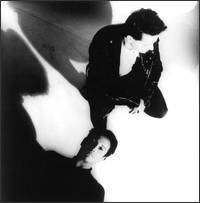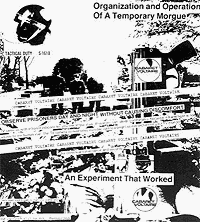
|
| In
the long list of precursors of electronica, people tend to forget about
Cabaret Voltaire—perhaps
because the band was simply around for so damn long. Between 1974 and
an unofficial dissolution in 1994, the Cabs released 18 albums and twice
that in re-releases, compilations and EPs. The band began as a trio: Richard
H. Kirk on guitar, Stephen Mallinder on bass and tape guy Chris Watson.
The band's biggest album was probably 1984's "Micro-Phonies." It even yielded a chart hit in the weirdly deconstructed funk of "James Brown," which broke the Godfather down into a looped funk bassline, some odd horn blurts and an exhortation to "willpower" layered over the usual asymmetrically-chopped samples. "Sensoria" layered hoarse, chanting vocals over a mesh of synth blips and shivering dance beats; an extra was a soundtrack composition, the breathtakingly otherworldly and purely electronic "Theme from Earthshaker." The next year's follow-up, "Arm of the Lord," was more abrasive and sometimes bordered on industrial music, especially on tracks like "I Want You" and "Hell's Home," which featured more aggressive (sometimes live) drumbeats, increasingly desperate vocals and ornate, ominous electronic backdrops. In 1986, Cabaret Voltaire collaborated with Chicago house guru Marshall Jefferson on "Groovy, Laidback & Nasty." Gradually, Cabaret Voltaire's music became more purely electronic, venturing into ambient, pre-drum 'n' bass sounds on a trio of discs released in 1993-94: "The Conversation," "Plasticity" and "International Language." But, due to increasing involvement in side projects and solo work, their output had become infrequent. Mallinder moved to Australia, Kirk took up with a new generation of electronic musicians in Sheffield and that was that. The legacy lives on in graduate students' home studios across the globe. |
 |
 Eventually,
the outfit was stripped down to Kirk and Mallinder (with occasional
contributors), with the former on vocals and bass and the latter on
"instruments (real and synthetic), electronics, globe scanner, short
wave radio." Gradually, Cabaret Voltaire's sound coalesced into a distinctive
blend of Kirk's death-whisper vocals and skeletal funk basslines and
Mallinder's cut-up dialogue, orchestrated sound effects and dance beats.
Eventually,
the outfit was stripped down to Kirk and Mallinder (with occasional
contributors), with the former on vocals and bass and the latter on
"instruments (real and synthetic), electronics, globe scanner, short
wave radio." Gradually, Cabaret Voltaire's sound coalesced into a distinctive
blend of Kirk's death-whisper vocals and skeletal funk basslines and
Mallinder's cut-up dialogue, orchestrated sound effects and dance beats.
 Another
field which
Another
field which